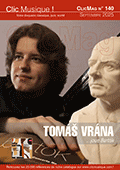 Issu d'une famille de musiciens, le violoncelliste allemand Bernhard Romberg connaît la gloire au début du dix-neuvième siècle tant pour sa virtuosité que pour ses compositions, puis voit son étoile pâlir au soir de sa vie : son jeu est décrié et ses œuvres disparaissent des programmes. Entretemps, il mène pendant quarante ans une brillante carrière de concertiste, sillonnant l'Europe et croisant nombre de contemporains : Beethoven, Reicha, Spohr, Weber... Compositeur, il laisse environ quatre-vingt partitions essentiellement consacrées à son instrument fétiche auquel il apportera plusieurs innovations techniques. Défendus avec vaillance et intégrité par le jeune soliste David Melkonyan et la Kölner Akademie dirigée par Michael Alexander Willens, ces deux concertos révèlent un petit maître qui fait vibrer et sonner son violoncelle avec brio et qui, dans ce répertoire, assure la jonction entre Haydn et Schumann ; mais sa musique, certes agréable, manque singulièrement de relief et de personnalité. Assez fades, les thèmes du Premier concerto (1790) s'oublient aussitôt qu'on les entend ; plus intéressant, le Cinquième concerto (1808) développe des mélodies aux contours plus affirmés et use de couleurs contrastées d'où émergent ici et là quelques tensions et accents dramatiques qui finissent par nous émouvoir un peu. Un CD réservé aux vrais mordus de violoncelle ! (Alexis Brodsky)  All those who occupy themselves with Bernhard Romberg’s life and work are immediately reminded of this traditional piece of wisdom. At the beginning of the nineteenth century he was acclaimed as an excellent virtuoso on the violoncello and recognized as one of the most important composers of his times. Even during his lifetime, however, he was forced to experience how his star declined, his playing style was regarded as old, and his compositions vanished from concert programs. During the early years of the new century the members of the press enthusiastically showered superlatives both on his cello playing and his compositional capabilities. He was regarded as »one of the most outstanding composers and one of the most consummate of all living cellists,« as »the first and greatest virtuoso on his instrument,« who also as a composer was »very significant« (Leipzig, 1807). Romberg’s cello concertos recorded here for the first time soon enjoyed great popularity. The press found that the Concerto No. 5 »stood at the top among all violoncello concertos,« a judgment that some fifteen yeas later, at the end of 1821, continued to hold – as we read in a review of the partbook edition, according to which the work was »in every respect one of the most beautiful concertos, and that this means one of the most beautiful of all for the violoncello is something that everybody knows.« Here the concertos are interpreted by the prizewinning young cellist Davit Melkonyan, who has received many honors and was supported by the "Yehudi Menuhin Live Music Now" organization.
 |
